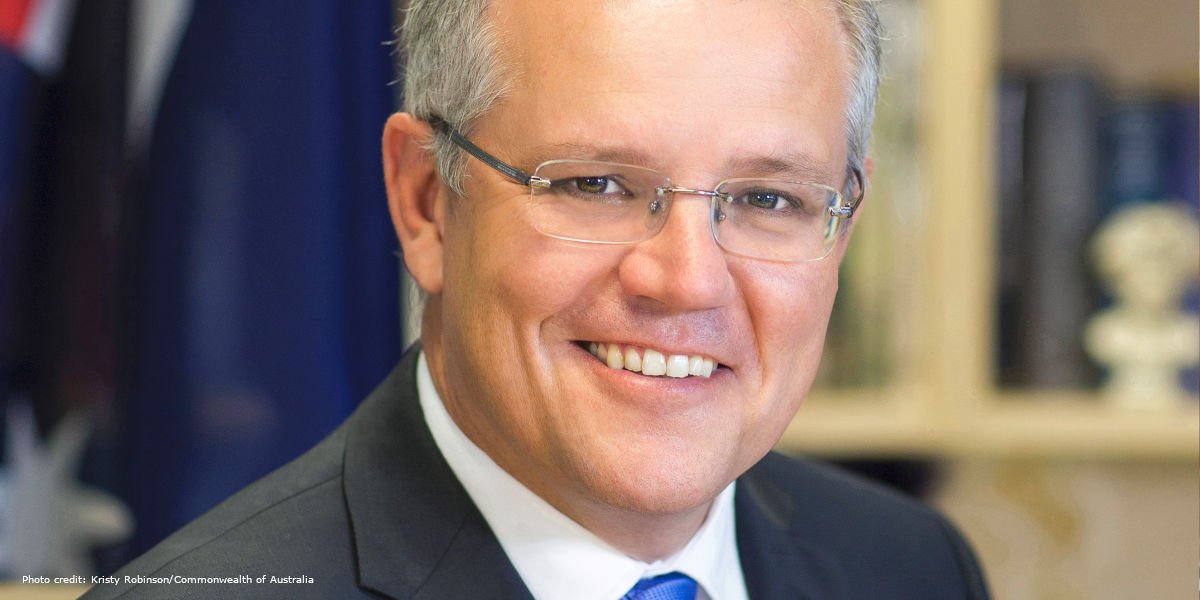Since emerging on the political stage Scott Morrison has cultivated the persona of the daggy suburban family man, who loves his wife, his children, and his football team; who works hard and is duly recompensed; believes in contributing to his community; and believes in a “fair go” for everybody prepared to “have a go”. He’s not the culture vulture that was Paul Keating; the egomaniac who needs to be at the centre of every decision that was Kevin Rudd; the ideological conservative that was Tony Abbott; nor the wealthy urban banker that was Malcolm Turnbull. He’s “Scomo”, all round decent “bloke” who does what he says and says what he does.
I’m beginning to think that this is not only a carefully cultivated narrative, but that it just might really be who Scott Morrison is…and it worries me. I like “Scomo” and could imagine myself sitting beside him eating a meat pie, sharing a joke and cheering the Cronulla Sharks. But we need someone more than the daggy suburban family man as Prime Minister.
The Old Testament contains a book called Proverbs that is loved in suburbia. It is a collection of pithy proverbial sayings like these:
A slack hand causes poverty,
but the hand of the diligent makes rich.A child who gathers in summer is prudent,
but a child who sleeps in harvest brings shame…The integrity of the upright guides them,
Proverbs 10:4-5; 11:3
but the crookedness of the treacherous destroys them.
In the world of Proverbs actions have consequences. Wise behaviour produces good life outcomes and foolish behaviour bad life outcomes. While there may well be unexpected setbacks, if we observe the rules we can expect life to turn out reasonably well.
Suburban life is the living proof of this. It’s the place where conventional wisdom works. Word hard and you’ll get a good job. Save diligently and you’ll be rewarded with home ownership and a comfortable retirement. Do the right thing by your neighbours and they’ll do the right thing by you. But live foolishly and you will reap the consequences: unemployment; financial struggle; broken relationships.
The danger of the conventional wisdom of Proverbs is that we assume it applies everywhere, so that wellbeing is always the outcome of the individual doing the right thing and ill being is the result of individuals failing to live by the inbuilt moral order of the universe. The book of Job challenges this simplistic way of thinking. It opens and closes with Job enjoying prosperity, health and wellbeing. At start and finish the ordered, action-consequence world of Proverbs is intact. But in-between Job loses everything. His wealth, his family, his health, and his reputation. Three friends come to offer comfort and counsel. In their eyes the ordered, action-consequence world of Proverbs is still operating. They argue that disaster has struck Job because he has done something foolish. He must identify what that is, confess his wrongdoing and God will restore him. Job (and the reader) knows this is not the case, that Job has done nothing to deserve this. We are confronted with a situation where the iron clad logic of a morally ordered universe has broken down.
If Job presents us with a world where there are occasional lapses in the act-consequence ordering the world, Ecclesiastes sees a world where order is impossible to find. Rather than the predictability of Proverbs, people who follow the dictates of wisdom find themselves broken by life, while fools who perpetrate violence, exploit, oppress and plot evil prosper! In the outlook of Ecclesiastes God may have put order in the world but it is excruciatingly difficult to see. The best you can do is live in a way that honours God and receive whatever moments of love and joy you can find as the gift of God.
The Prime Minister’s policies and statements suggest that his primary frame of reference is the ordered world of Proverbs. At his opening press conference as Prime Minister he said:
“I believe in a fair go for those who have a go, and what that means is part of the promise that we all keep as Australians is that we make a contribution and don’t seek to take one.”
“When all Australians do that, that’s when we get the fair go mentality and culture that has made our country strong today. So under our policies, if you’re having a go you’ll get a go. And that involves an obligation on all of us to be able to bring what we have to the table.
“It doesn’t matter what level of ability you have, what your means are, where you live in this country. It matters that we all bring our best. Under my government, under our government, under a Liberal Nationals government, we will always be backing in those Australians who are looking to make a contribution not take one and, together, that’s how we make our country stronger.”
PM Press Conference
Kathryn Murphy decoded this in an astute piece in the Guardian.
This idea that some categories of people are inherently more deserving than others; that finding yourself on the bottom rung of the ladder is attributable not to a set of circumstances that governments might look at correcting for the good of society as a whole, but because of a failure of individual imagination and work ethic
Kathryn Murphy, “The meaning of Morrison’s mantra about getting a fair go is clear. It’s conditional“, Guardina Online
Morrison’s logic is the conventional wisdom of Proverbs untempered by the caution of Job and Ecclesiastes. It explains life in terms of individual failure and is blind to systemic societal failures. It explains why the Prime Minister can resist calls to raise the Newstart allowance coming from groups as disparate as the Business Council of Australia and the Australian Council of Social Services. It appears the PM really does believe the unemployed are the undeserving, that anyone who wants a job can have one, and that to raise the allowance to a level that didn’t leave people mired in poverty would reward laziness.
This logic was right there in Scott Morrison’s maiden speech.
From my faith I derive the values of loving-kindness, justice and righteousness, to act with compassion and kindness, acknowledging our common humanity and to consider the welfare of others; to fight for a fair go for everyone to fulfil their human potential and to remove whatever unjust obstacles stand in their way, including diminishing their personal responsibility for their own wellbeing; and to do what is right, to respect the rule of law, the sanctity of human life and the moral integrity of marriage and the family.
Scott Morrison, Maiden Speech, Feb 14, 2008
In the well-ordered act-consequence world of conventional wisdom, justice doesn’t look to correct systemic injustices, but ensures that individuals receive their due. Those who do the right thing are rewarded, those who do the right thing but have a temporary setback are assisted, and those who do the wrong thing are punished. Thus fighting for a “fair go for all” includes confronting people with “their personal responsibility for their own wellbeing”.
This might be sufficient for two blokes sharing a beer in a suburban backyard as they diagnose what’s gone wrong in the world and how to set it right. It’s not sufficient in a Prime Minister. I hope I am wrong, but I fear Scott Morisson may well be the daggy suburban family man he portrays himself to be.








thanks Scott, spot on. Individualising problems that result from systemic problems is never going to find real solutions. Many of the responses for or mental health and suicide crisis fail at the same level. Inadequate income and drug testing are not the answer, we need major systems reform. I don’t seen any vision or plan. Reminds me of an old Dave Warner song: ‘just a suburban boy’
yes, I fear you are right.
yes, I think you’re right…
Quoting Katherine Murphy destroys a lot of your proposition
In what way? I think it reinforces Scott’s argument that, while we all need to take personal responsibility as far as we are able, systemic disadvantage needs to be addressed by government and other major players
She is typical of journalists who does not let a complete story be told and just selectively reports .
Hi John,
I don’t want to get into a debate about Katherine Murphy. The post is about Scott Morrison, his assumptions about the unemployed, personal responsibility and systemic issues.
I was making the observation that Katherine Murphy did not help your proposition